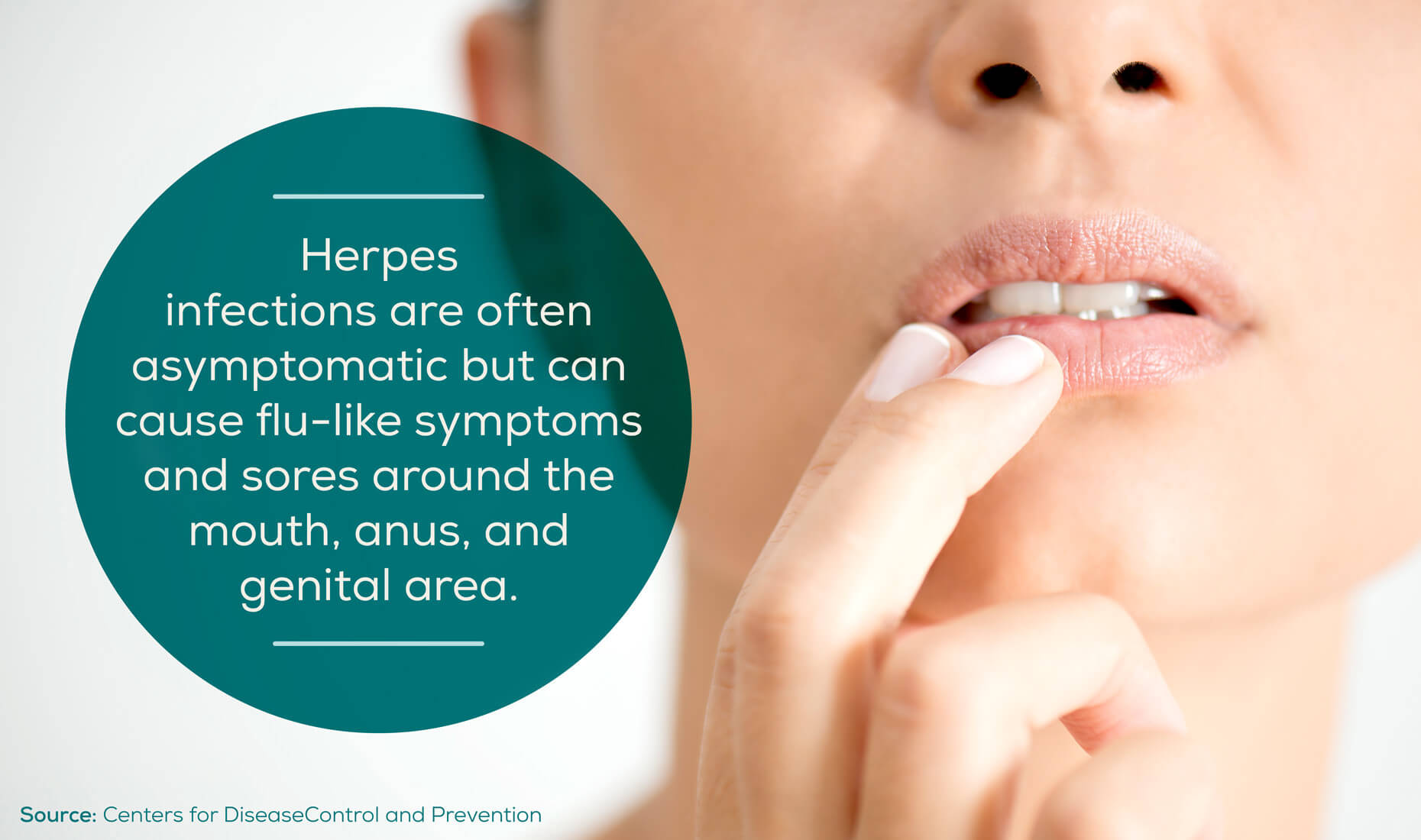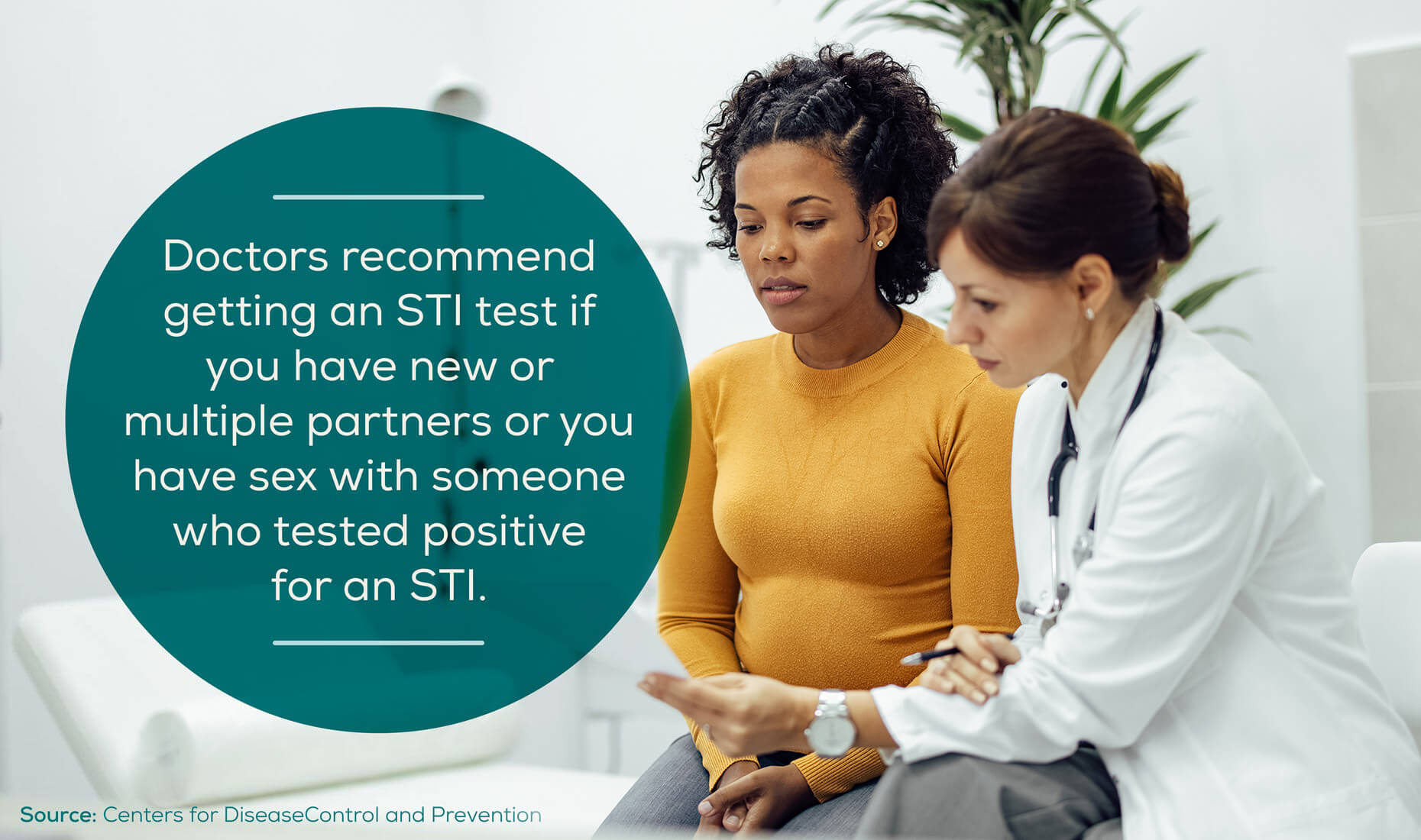
Living With Herpes: What You Need to Know About Dating and Treatment
Last updated October 2, 2023.
Table of contents
- What To Do After You’re Diagnosed
- 4 Tips for Dating With Herpes
- Common Questions About Living With Herpes
- Breaking the Stigma
- Additional Resources
- Related Content
Being diagnosed with herpes can bring up a lot of strong emotions. It’s normal to feel anxious or embarrassed at first, but these feelings often fade over time as people learn more about the virus and discover that they aren’t alone. Most people with herpes live completely normal lives and can maintain healthy relationships.
Herpes infections are very common. An estimated 50 to 80 percent of adults in the U.S. have oral herpes, and roughly 1 in 6 people ages 14 to 49 have genital herpes. [1, 2] Herpes simplex virus (HSV) is not deadly and rarely causes serious health problems. [3] While it isn’t curable, many people never experience symptoms and there are multiple treatment options available to help manage outbreaks.
Read on to learn what to expect after an HSV diagnosis and discover helpful tips for living and dating with herpes.
What To Do After You’re Diagnosed
If you’ve been diagnosed with herpes, you can take steps to help manage your symptoms and keep yourself healthy.
Know What Symptoms To Expect

Symptoms can vary depending on which areas of your body are affected and the type of virus you have. If you experience symptoms at all, they will likely be more severe after the initial infection than they are during recurring outbreaks. [4] The most common symptoms to expect include [5]:
- Sores around the genitals, rectum, or mouth (genital herpes)
- Blisters or cold sores around the mouth (oral herpes)
- Fever and other flu-like symptoms (during initial outbreak only)
- Small bumps that resemble an ingrown hair or pimple (genital herpes)
There are two strains of the herpes virus to be aware of: HSV-1 and HSV-2. While HSV-1 is most commonly associated with oral herpes and HSV-2 with genital herpes, either strain can cause either version of the virus.
Talk With Your Healthcare Provider About Treatment Options
There is currently no cure for herpes, but there are treatment options that can help improve symptoms and reduce the risk of spreading the virus. Even if you aren’t experiencing any symptoms, you should still ask your doctor about possible treatment options.
If you have genital herpes caused by HSV-2, your doctor may prescribe an oral antiviral medication to treat a current outbreak and prevent recurrences. [6] These medications can’t cure HSV, but they can reduce symptoms and suppress the virus to help reduce the risk of spreading it to a partner. Antiviral medications are also effective in suppressing and managing symptoms of HSV-1. However, this strain has a much lower risk of recurrences and genital shedding after the initial infection [7], so suppressive therapy is typically not recommended.
If you have cold sores caused by oral herpes, your doctor may recommend taking antiviral medications or topical ointments to alleviate symptoms. [1] You can also buy over-the-counter topical anti-inflammatory agents or anesthetics to reduce pain and inflammation.
Learn How Herpes Spreads

Learning how herpes spreads can provide some insight into how you contracted it and how you can avoid spreading it to other people. While HSV primarily spreads through sexual contact [7], a person can also get it by touching affected skin, saliva, or herpes sores. You can contract oral herpes by kissing someone with an open sore, for example.
It’s important to remember that a person can still spread HSV even if they aren’t experiencing any symptoms. Fortunately, the herpes virus quickly dies if it is away from the body, so you won’t contract it from touching objects or surfaces. If you have any questions about how herpes spreads, consider discussing the risks with a medical professional.
Prioritize Your Mental Health
Being diagnosed with HSV can cause stress, anxiety, and other feelings that can sometimes be difficult to deal with. If you’ve recently been diagnosed with HSV and are feeling overwhelmed, you’re not alone. It's OK to take time to process your emotions and reach out for help if needed.
If you have medical-related concerns, your doctor may be able to ease your mind by going over treatment options and explaining the risks. You can also ask for additional resources or a reference for a mental health professional who can help you manage feelings of stress or anxiety.
Get Tested for Other Possible STIs

If you are sexually active, you should ask your doctor about testing options for other STIs like chlamydia, syphilis, HIV, and HPV. Many STIs can be asymptomatic, and early detection can reduce the risk of spreading them or developing symptoms later on.
The CDC lists the following STI screening recommendations for sexually active adults [8]:
- Everyone ages 13 to 64 should get tested at least once for HIV.
- Anyone who has sex with new or multiple male partners should get tested once a year for syphilis, chlamydia, and gonorrhea.
- Everyone who is pregnant should get tested for syphilis, HIV, hepatitis B, and hepatitis C early in their pregnancy.
- People with new or multiple sex partners should get tested for HIV at least once a year.
If you’re unsure about which STI tests you need or when you should get them, you can ask your doctor for advice. They can make recommendations based on your sexual history and provide additional information on different types of STI tests.
4 Tips for Dating With Herpes

Receiving a herpes diagnosis can be nerve-wracking, but empowering yourself with knowledge from a medical professional will make navigating romance and dating much easier. Many people with herpes experience no complications and have healthy sexual and romantic relationships. However, there are a few extra steps to follow when dating with herpes.
1. Be Honest With Your Partner
Telling past and current partners that you have an STI isn’t always easy. However, having an open and honest conversation about your diagnosis can help prevent you from spreading it and give your partner some peace of mind. Because herpes is so common, you might even learn that your partner has it, too.
Before you dive into this conversation, consider finding a time when neither of you is distracted and you can find a private place to talk. It’s important to tell your partner as soon as possible, but the middle of an argument or a busy workday probably isn't the best time. Dropping the news when one of you is already stressed could cause a productive conversation to spiral into an argument.
It’s normal for your partner to ask a lot of questions after learning about your diagnosis. They might wonder when you were diagnosed, how you might have gotten it, and what the risks are. It’s normal for these questions to feel a little uncomfortable, but try to remember that your and your partner’s health are a top priority. Answering these questions as honestly as possible allows your partner to make an informed decision about STI testing and can help you decide on future prevention strategies.
2. Ask the Right Questions
While you should devote time and attention to answering your partner’s questions, it should still be a two-way conversation. Come prepared with a few questions to ask your partner to avoid miscommunication and get you both on the same page.
Asking about their willingness to discuss sexual health-related topics is a great place to start. If they tell you that they’re uncomfortable with the conversation or shut down after learning about your diagnosis, that’s a good sign that you may need to take a break and regroup later.
Once you’re both ready to talk, it can be helpful to ask about the date of their last STI test and what their results were, if you haven’t already. If it’s been a while or they’ve had new sexual partners since then, you could suggest scheduling an STI test. Learning about their STI status not only gives them more control over their health, but also helps inform conversations about having safe sex in the future.
3. Avoid Misinformation
When discussing HSV with a partner, it’s crucial that you avoid unintentionally spreading misinformation or misrepresenting the risks. To avoid this, try to do some research ahead of time and be prepared to share what you learned. Your doctor can answer any questions you have about your diagnosis and may be able to provide educational materials for you and your partner. If you need help finding reliable information, you can also visit the CDC website to learn more about risks, symptoms, and treatment options.
4. Practice Safe Sex
If you’ve discussed the risks with your partner and decide to remain sexually active, there are steps you can take to reduce the risk of transmission. For people with oral herpes, it can be as simple as avoiding kissing and oral sex until any sores have completely healed.
People with genital herpes should take a few extra precautions before resuming sexual activity. Condoms and dental dams don’t completely eliminate the risk, but using them correctly every time you have sex can greatly reduce your chances of passing genital herpes on to a partner. Your doctor may also recommend taking a suppressive antiviral medication and avoiding sexual activity if you have an active outbreak. [5]
No matter which type of herpes you have, you should always ask your doctor about the best ways to protect yourself and your partner.
Common Questions About Living With Herpes
It’s normal to have a lot of questions after testing positive for herpes. While it’s best to ask a medical professional for more information about your diagnosis, the following commonly asked questions can be a good place to start.
Is Herpes Curable?
There is currently no cure for herpes. However, there are antiviral medications available that can help treat your symptoms, reduce future outbreaks, and lower the risk of passing the virus along to others. [9] Even if you’re asymptomatic, you should talk to your doctor about which treatment options could work best for you.
Does Herpes Affect Pregnancy?
If you contracted genital herpes long before getting pregnant, it’s unlikely that you’ll pass it on to your baby during childbirth. However, it’s still important to tell your doctor that you have genital herpes if you’re pregnant to ensure that the baby remains healthy.
Herpes infections that start late in pregnancy carry more risks. Studies suggest that having genital herpes while pregnant can increase the risk of miscarriage and early birth, making prenatal care essential. [5] While the risk is low, you can also pass herpes to the baby if you have sores during vaginal childbirth, which can lead to eye problems and even brain damage in newborns. [10]
If you contract herpes during pregnancy, your doctor will closely monitor your progress and may recommend taking herpes medication to help reduce the risk of passing it to your baby during birth. They might also recommend delivering via C-section if you have sores in your genital area when you go into labor.
What Should I Do if My Partner Has Herpes?
If your partner tells you that they have herpes, it’s important to approach the conversation in a calm and understanding manner. Having herpes doesn’t mean that they’re bad or did something wrong—it simply means that they contracted an extremely common virus that can easily go undetected.
The first thing you should do once you’ve talked to your partner is to schedule an appointment for a herpes test. Even if you aren’t experiencing any symptoms, a doctor can perform a blood test to identify HSV antibodies in your system. They may also recommend testing for other common STIs if you meet the criteria.
If you or your partner is uncomfortable with getting tested at a regular doctor’s office, many clinics that specialize in reproductive health offer low-cost and discreet testing options. You can also order our at-home tests for people with traditionally male or female reproductive systems that test for HSV-2, chlamydia, gonorrhea, hepatitis C, HIV, syphilis, and trichomoniasis.
Breaking the Stigma
Unfortunately, there are some myths and misconceptions surrounding herpes and other STIs that can leave those affected feeling guilty and confused. In some cases, the negative stigma can prevent people from seeking a diagnosis and proper care that could greatly improve their quality of life.
The most important thing you can do if you or someone you know is diagnosed with herpes is to avoid casting blame. Herpes can remain dormant for years, and you can unknowingly contract it even if you use protection and do everything “right.” Trying to find someone to blame will only hurt others and reinforce the idea that people who get STIs are “irresponsible” or “unfaithful.”
The best way to break the stigma is to educate yourself and others about the virus and how it affects people. Promoting open communication and education will not only encourage people to get the help they need, but also encourage the idea that STIs are nothing to be ashamed of.
Additional Resources
If you are looking for more information or strategies for living with herpes, the following resources can help:
- Genital Herpes: Commonly Asked Questions
- OASH Genital Herpes Resource Page
- Adjusting to a Herpes Diagnosis
- AHF Herpes Resource Center
Herpes is extremely common and isn’t anything to be ashamed of. As long as you prioritize your physical and mental health, get tested regularly for STIs, and engage in open conversations with your sexual partners, herpes shouldn’t slow you down.
Related Content
Do I Have Herpes and Not Know It?
Herpes Online Treatment: How It Works
References
- Oral Herpes. Johns Hopkins Medicine. URL. Accessed April 5, 2022.
- Genital Herpes. Johns Hopkins Medicine. URL. Accessed April 5, 2022.
- Living With Herpes. Planned Parenthood. URL. Accessed April 5, 2022.
- Genital Herpes. Mayo Clinic. URL. Accessed April 5, 2022.
- Genital Herpes – CDC Fact Sheet. Centers for Disease Control and Prevention. URL. Accessed April 5, 2022.
- Herpes – STI Treatment Guidelines. Centers for Disease Control and Prevention. URL. Accessed April 5, 2022.
- STD Facts – Genital Herpes. Centers for Disease Control and Prevention. URL. Accessed April 5, 2022.
- What STD Tests Should I Get? Centers for Disease Control and Prevention. URL. Accessed April 5, 2022.
- Genital Herpes Treatment and Care. Centers for Disease Control and Prevention. URL. Accessed April 5, 2022.
- Living with Herpes. Planned Parenthood. URL. Accessed April 5, 2022.
